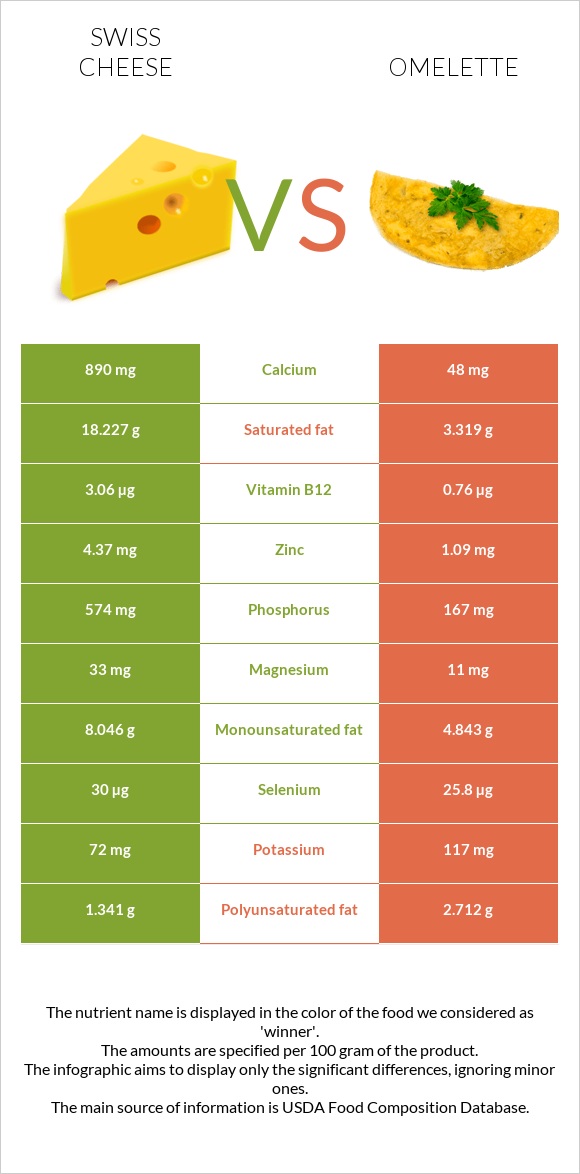Swiss cheese vs. Omelette — In-Depth Nutrition Comparison
Compare
Significant differences between Swiss cheese and omelette
- Swiss cheese is richer in vitamin B12, calcium, phosphorus, and zinc, while omelette is higher in choline, vitamin B5, iron, and vitamin D.
- Swiss cheese covers your daily vitamin B12 needs 96% more than omelette.
- Swiss cheese has 19 times more calcium than omelette. Swiss cheese has 890mg of calcium, while omelette has 48mg.
- Omelette is lower in saturated fat.
- Swiss cheese has a higher glycemic index (27) than omelette (0).
Specific food types used in this comparison are Cheese, swiss and Egg, whole, cooked, omelet.
Infographic

Infographic link
Mineral Comparison
Mineral comparison score is based on the number of minerals by which one or the other food is richer. The "coverage" charts below show how much of the daily needs can be covered by 300 grams of the food.
| Contains more MagnesiumMagnesium | +200% |
| Contains more CalciumCalcium | +1754.2% |
| Contains more ZincZinc | +300.9% |
| Contains more PhosphorusPhosphorus | +243.7% |
| Contains more SeleniumSelenium | +16.3% |
| Contains more PotassiumPotassium | +62.5% |
| Contains more IronIron | +1038.5% |
| Contains more CopperCopper | +34% |
| Contains less SodiumSodium | -17.1% |
Vitamin Comparison
Vitamin comparison score is based on the number of vitamins by which one or the other food is richer. The "coverage" charts below show how much of the daily needs can be covered by 300 grams of the food.
| Contains more Vitamin AVitamin A | +67.4% |
| Contains more Vitamin B12Vitamin B12 | +302.6% |
| Contains more Vitamin EVitamin E | +115% |
| Contains more Vitamin DVitamin D | +∞% |
| Contains more Vitamin B1Vitamin B1 | +209.1% |
| Contains more Vitamin B2Vitamin B2 | +27.8% |
| Contains more Vitamin B5Vitamin B5 | +265.2% |
| Contains more Vitamin B6Vitamin B6 | +101.4% |
| Contains more Vitamin KVitamin K | +221.4% |
| Contains more FolateFolate | +290% |
All nutrients comparison - raw data values
| Nutrient |  |
 |
DV% diff. |
| Vitamin B12 | 3.06µg | 0.76µg | 96% |
| Calcium | 890mg | 48mg | 84% |
| Cholesterol | 93mg | 313mg | 73% |
| Saturated fat | 18.227g | 3.319g | 68% |
| Phosphorus | 574mg | 167mg | 58% |
| Choline | 15.5mg | 247.6mg | 42% |
| Protein | 26.96g | 10.57g | 33% |
| Fats | 30.99g | 11.66g | 30% |
| Zinc | 4.37mg | 1.09mg | 30% |
| Vitamin B5 | 0.353mg | 1.289mg | 19% |
| Iron | 0.13mg | 1.48mg | 17% |
| Vitamin A | 288µg | 172µg | 13% |
| Calories | 393kcal | 154kcal | 12% |
| Vitamin D | 0 IU | 69 IU | 9% |
| Vitamin D | 0µg | 1.7µg | 9% |
| Polyunsaturated fat | 1.341g | 2.712g | 9% |
| Selenium | 30µg | 25.8µg | 8% |
| Monounsaturated fat | 8.046g | 4.843g | 8% |
| Folate | 10µg | 39µg | 7% |
| Vitamin B2 | 0.302mg | 0.386mg | 6% |
| Vitamin B6 | 0.071mg | 0.143mg | 6% |
| Magnesium | 33mg | 11mg | 5% |
| Vitamin E | 0.6mg | 1.29mg | 5% |
| Vitamin K | 1.4µg | 4.5µg | 3% |
| Copper | 0.047mg | 0.063mg | 2% |
| Vitamin B1 | 0.011mg | 0.034mg | 2% |
| Potassium | 72mg | 117mg | 1% |
| Sodium | 187mg | 155mg | 1% |
| Net carbs | 1.44g | 0.64g | N/A |
| Carbs | 1.44g | 0.64g | 0% |
| Sugar | 0g | 0.31g | N/A |
| Manganese | 0.026mg | 0.024mg | 0% |
| Vitamin B3 | 0.064mg | 0.064mg | 0% |
| Trans fat | 0.987g | 0.709g | N/A |
| Tryptophan | 0.401mg | 0.14mg | 0% |
| Threonine | 1.038mg | 0.467mg | 0% |
| Isoleucine | 1.537mg | 0.565mg | 0% |
| Leucine | 2.959mg | 0.913mg | 0% |
| Lysine | 2.585mg | 0.767mg | 0% |
| Methionine | 0.784mg | 0.319mg | 0% |
| Phenylalanine | 1.662mg | 0.572mg | 0% |
| Valine | 2.139mg | 0.722mg | 0% |
| Histidine | 1.065mg | 0.26mg | 0% |
| Omega-3 - DHA | 0g | 0.049g | N/A |
| Omega-3 - ALA | 0.125g | N/A | |
| Omega-3 - DPA | 0.018g | 0.006g | N/A |
| Omega-3 - Eicosatrienoic acid | 0.003g | N/A | |
| Omega-6 - Gamma-linoleic acid | 0.002g | N/A | |
| Omega-6 - Dihomo-gamma-linoleic acid | 0.032g | N/A | |
| Omega-6 - Eicosadienoic acid | 0.007g | 0.015g | N/A |
| Omega-6 - Linoleic acid | 0.734g | N/A |
Macronutrient Comparison
Macronutrient breakdown side-by-side comparison
Protein:
26.96 g
Fats:
30.99 g
Carbs:
1.44 g
Water:
37.63 g
Other:
2.98 g
Protein:
10.57 g
Fats:
11.66 g
Carbs:
0.64 g
Water:
76.13 g
Other:
1 g
| Contains more ProteinProtein | +155.1% |
| Contains more FatsFats | +165.8% |
| Contains more CarbsCarbs | +125% |
| Contains more OtherOther | +198% |
| Contains more WaterWater | +102.3% |
Fat Type Comparison
Fat type breakdown side-by-side comparison
Saturated fat:
Sat. Fat
18.227 g
Monounsaturated fat:
Mono. Fat
8.046 g
Polyunsaturated fat:
Poly. Fat
1.341 g
Saturated fat:
Sat. Fat
3.319 g
Monounsaturated fat:
Mono. Fat
4.843 g
Polyunsaturated fat:
Poly. Fat
2.712 g
| Contains more Mono. FatMonounsaturated fat | +66.1% |
| Contains less Sat. FatSaturated fat | -81.8% |
| Contains more Poly. FatPolyunsaturated fat | +102.2% |





